
1.800.643.5596 • Lomanco, Inc. • lomanco.com
Subscribe on
YouTube
Find us on
Facebook
INSTALLATION
1. Determine approximately where on
your roof you will place your Power
Ventilator.
• At the highest point in your
attic or air space. Best if
centered on roof length, and
less conspicuous if placed on
side away from street.
• IMPORTANT: Keep the highest
part of the dome lower than
the ridge line to ensure that
the dome's edge is NOT above
ridge line. (Typically, the center
of the vent should be about 24
inches down from the ridge.)
• Establish your position with
accuracy (because you will
want to duplicate it inside your
attic) by measuring down from
the ridge and over from the
roof edge.
2. Working now from the inside,
mark your planned opening (as
you established position when on
roof) and relocate your position to
be centered between two rafters.
Drive a nail into the roof so that
it can be easily found when you
return to the roof. Before you return
to the roof, be sure that you have:
(a) string or compass, (b) drill and drill
bit, (c) keyhole or electric jig (saber)
saw with a sharp coarse blade, (d)
ventilator and base, (e) roong nails
and hammer, and (f) roong cement
and applicator.
3. Using the nail driven from the inside
as center, scribe a 14” diameter circle
using string or compass. Care should
be taken not to make the hole too
large.
4. Drill a starting hole for sawing inside
the scribed circle.
5. Starting in the drilled hole, cut circular
opening, following the scribed line.
Use either keyhole or an electric jig
(saber) saw with a sharp coarse blade
to cut shingles and roof boards at
one time. If you do not have a coarse
blade, cut away shingles inside the
circle with utility knife before cutting
roof boards.
6. Carefully remove roong nails from
top row of shingles so that the
ashing of the ventilator will slide
under top row.
Slide ventilator carefully into place
with arrow pointing up, letting the
combination control hang down into
opening. Fasten the aluminum base
to roof boards with roong nails.
Keep heads of nails under shingles
wherever possible.
7. Finish the exterior mounting by
sealing all seams and nails with
roong cement. Use cement also
to fasten down loose edges of
shingles. Return to the attic. You
now have to mount the combination
control box and connect the wiring.
WARNING —TO REDUCE THE RISK OF FIRE,
ELECTRIC SHOCK, OR INJURY TO
PERSONS, OBSERVE THE FOLLOWING:
A. Use this unit only in the manner intended by the manufacturer.
If you have any questions, contact the manufacturer.
B. Before servicing or cleaning unit, switch power off at service
panel and lock service panel to prevent power from being
switched on accidentally. When the service panel cannot be
locked, securely fasten a prominent warning device, such as
a tag to the service panel.
C. Installation work and electrical wiring must be done by
qualied person(s) in accordance with all applicable codes
and standards, including re-rated construction.
D. Sufcient air is needed for proper combustion and exhausting
of gases through the ue (chimney) of fuel-burning equipment
to prevent back drafting. Follow the heating equipment
manufacturer’s guide lines and safety standards, such as
those published by the National Fire Protection Association
(NFPA) and the American Society for Heating, Refrigeration
and Air Conditioning Engineers (ASHRAE), and the local
code authorities.
E. When cutting or drilling into wall or ceiling, do not damage
electrical wiring or other hidden utilities.
F. Ducted fans must always be vented to the outdoors.
G. If this unit is to be installed over a tub or shower, it must be
marked as appropriate for the application.
H. NEVER - place a switch where it can be reached from a tub
or a shower.
CAUTION - For general ventilating use only. Do not use to
exhaust hazardous or explosive materials and vapors.
CAUTION- This unit has an unguarded fan blade. Do not
use in locations readily accessible to people or animals. This
fan is intended for use facing an unoccupied space only.
Be sure your fan is properly installed. Your fan is designed to
operate on 120 VAC 60 Hz.
Sharp edges are exposed during installation. Use gloves and
other safety equipment to avoid accidents.
WARNING - To reduce the risk of re or electric shock, do
not use this fan with any solid state speed control.
IMPORTANT
With the power vent installed, at least 768 square inches of
inlet area must be provided.
OPERATION
Your ventilator will operate automatically as needed. The
adjustable thermostat has been set at the factory to come
on at 100°F., off at 85°F. The motor has been permanently
lubricated and does not require additional lubrication.
Condensation occurs when air touches a surface whose
temperature is at the dew point of the air (100% relative
humidity). For automatic humidistat operation, set the
humidistat at 70%-80%. This will activate the power ventilator
before the air reaches 100% relative humidity. If the area
remains too humid of if mold and/or mildew is present, set
the humidistat to 40%. If the fan run excessively and the area
is not over humid, increase the setting of the humidistat to a
higher percentage rate.
LomanCool
TM
2000TH
Power Vent Installation Instructions
20600_0717

1.800.643.5596 • Lomanco, Inc. • lomanco.com
Subscribe on
YouTube
Find us on
Facebook
NOTE: If the dome is removed for any
reason, torque the mounting screw to
a maximum of 60 inch-pounds (+/-5)
when reinstalled. CAUTION - DO NOT
OVERTIGHTEN
8. Position the combination control
base high (in the warmest part of the
air space) and above the ventilator
opening. Make sure that exible
cable does not touch the roof or
rafters. (This will eliminate vibration
noise.)
The combination control is a delicate
instrument, use screws instead of
nails when fastening bracket to roof
rafter.
Your Lomanco Power Ventilator
MUST be wired as shown. Make all
connections inside the combination
control box. Connect white (neutral)
wire from a power supply to white
wire on motor. Connect black (hot)
wire from power supply to black wire
on the thermostat in the combination
control. The other black wire on the
thermostat and black wire on switch
have been connected to the black
wire on the motor at the factory but
should be checked to ensure a good
tight connection. The ground wire
from the supply should be connected
to the green screw in the bottom
of the combination control box.
9. WARNING! Turn o power before
connecting power wires to ventilator.
Your power feed wire should be 14
gauge or larger wire size (two wires
plus ground). Take from combination
control box and bring to power
distribution panel. Feed through
bushing and connect to 15-amp
circuit breaker.
• Black to circuit breaker
• White to neutral base
• Plain to ground base
Recheck your connections then turn
the power on. You should now enjoy
the advantages of a Power Ventilator,
operating as the thermostat and
humidistat demands.
A test switch has been provided.
To make sure your Lomanco Power
Ventilator is operating properly,
simply “PUSH TO TEST.” Caution
should be taken to ensure that no
body parts come in contact with any
of the vent’s moving parts during this
test.
LomanCool
TM
2000TH
20600_0717
Parts and accessories available online at lomanco.com
Power Vent Installation Instructions
LIMITED WARRANTY
Lomanco, Inc. Warrants this product for ve (5) years against any defects due to workmanship,
parts or mechanical failure. For warranty service the defective part must be sent, freight
prepaid to Lomanco Inc. P.O. Box 519, 2101 West Main Street, Jacksonville, Arkansas 72076. If
the part is found to be defective it will be replaced with a new part at no charge and returned,
freight prepaid. This warranty does not include replacement due to destructive storms or labor
cost incurred in the removal of any defective part/product or installation of the new part/
product. Online registration of the product at www.lomanco.com within ten (10) days of the
initial installation of the product is a condition precedent to warranty coverage. ANY IMPLIED
WARRANTIES OF MERCHANTABILITY AND FITNESS FOR A PARTICULAR PURPOSE ARE ALSO
LIMITED IN DURATION TO FIVE (5) YEARS. CONSEQUENTIAL DAMAGES TO PROPERTY RESULTING
FROM A BREACH OF ANY WARRANTY MENTIONED HEREIN ARE EXPRESSLY EXCLUDED. Some
states do not allow limitations on how long an implied warranty lasts or do not allow exclusion or
limitation of consequential damages, so the above limitation may not apply to you. The warranty
gives you specic legal rights and you may also have other rights which
vary from state to
state.
ONLINE WARRANTY REGISTRATION
Please ll out the online form at lomanco.com
to complete your warranty registration. If for
any reason you are unable to register your
product online please call 800-643-5596 and
we will assist you. Purchase and install date
information will be required.
THREE
MUST
DO
Steps
to attic ventilation
Install all Exhaust Ventilation at the SAME HEIGHT
within a common attic area.
Installation of exhaust vents at more than one level on a roof allows the
upper exhaust vent to pull air in from lower exhaust vents rather than
from the intake vents. Intake air must come from intake vents located
near the lower part of the attic space to properly ventilate the total attic
area and eliminate weather infiltration.
Install ONLY ONE TYPE of Exhaust Ventilation within a
common attic area.
Exhaust Vents pull air from the easiest intake source. Vent types cannot
be mixed. The use of different types of exhaust vents could make one of
the vents act as intake for the other. Intake air must come from intake
vents located near the lower part of the attic space to properly ventilate
the total attic area and eliminate weather infiltration.
Install a BALANCED SYSTEM of Intake and Exhaust
Ventilation.
50% Intake Ventilation - Intake vents located near the lower part of
the attic area are required to balance out your ventilation system.
50% Exhaust Ventilation - Use a Lomanco Ventilation Selector Guide,
the calculators at lomanco.com, or the Lomanco Vent Selector App to
determine the number of vents needed to properly ventilate an attic to
meet the minimum code ventilation standard.
1
2
3
-
 1
1
-
 2
2
Lomanco 2000TH Operating instructions
- Type
- Operating instructions
Ask a question and I''ll find the answer in the document
Finding information in a document is now easier with AI
Related papers
Other documents
-
Gibraltar Building Products PRV50BL Operating instructions
-
Construction Metals RV2050WH-7 User manual
-
Dot Metal Products TP10G User manual
-
Gibraltar Building Products 12020 User manual
-
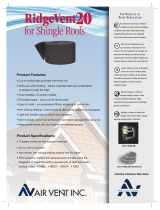 Air Vent MRV20 Specification
Air Vent MRV20 Specification
-
GAF EZCR1 Master Flow EZ Cool Plug-In Power Attic Vent Operating instructions
-
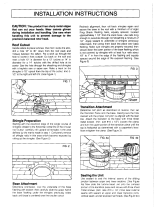 Air Vent 52613 Installation guide
Air Vent 52613 Installation guide
-
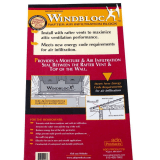 ADO Products WB1285 Installation guide
ADO Products WB1285 Installation guide
-
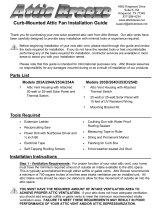 Attic Breeze 254A Installation guide
Attic Breeze 254A Installation guide
-
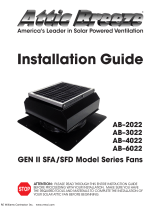 Attic Breeze AB-3022A - GRY Installation guide
Attic Breeze AB-3022A - GRY Installation guide










